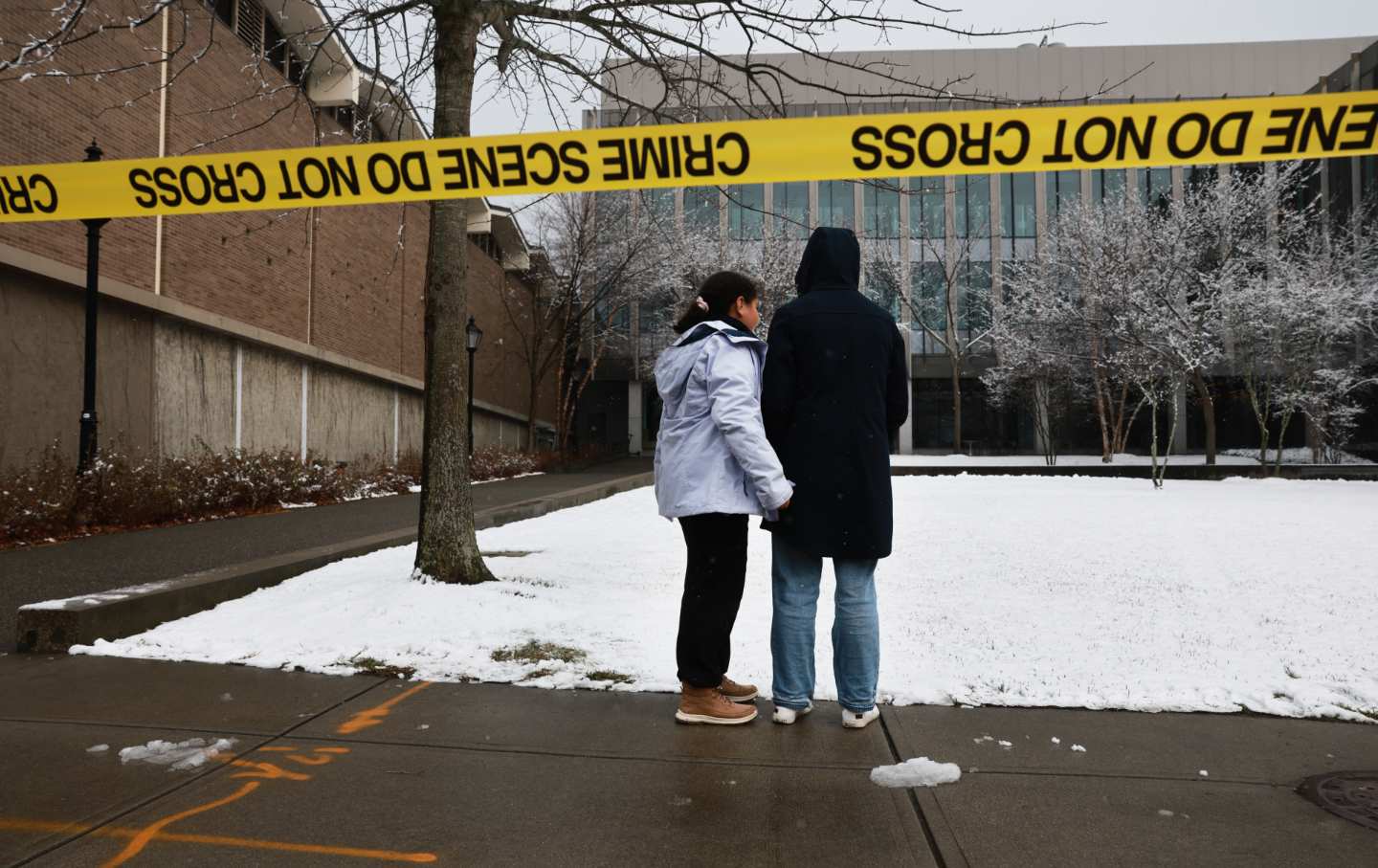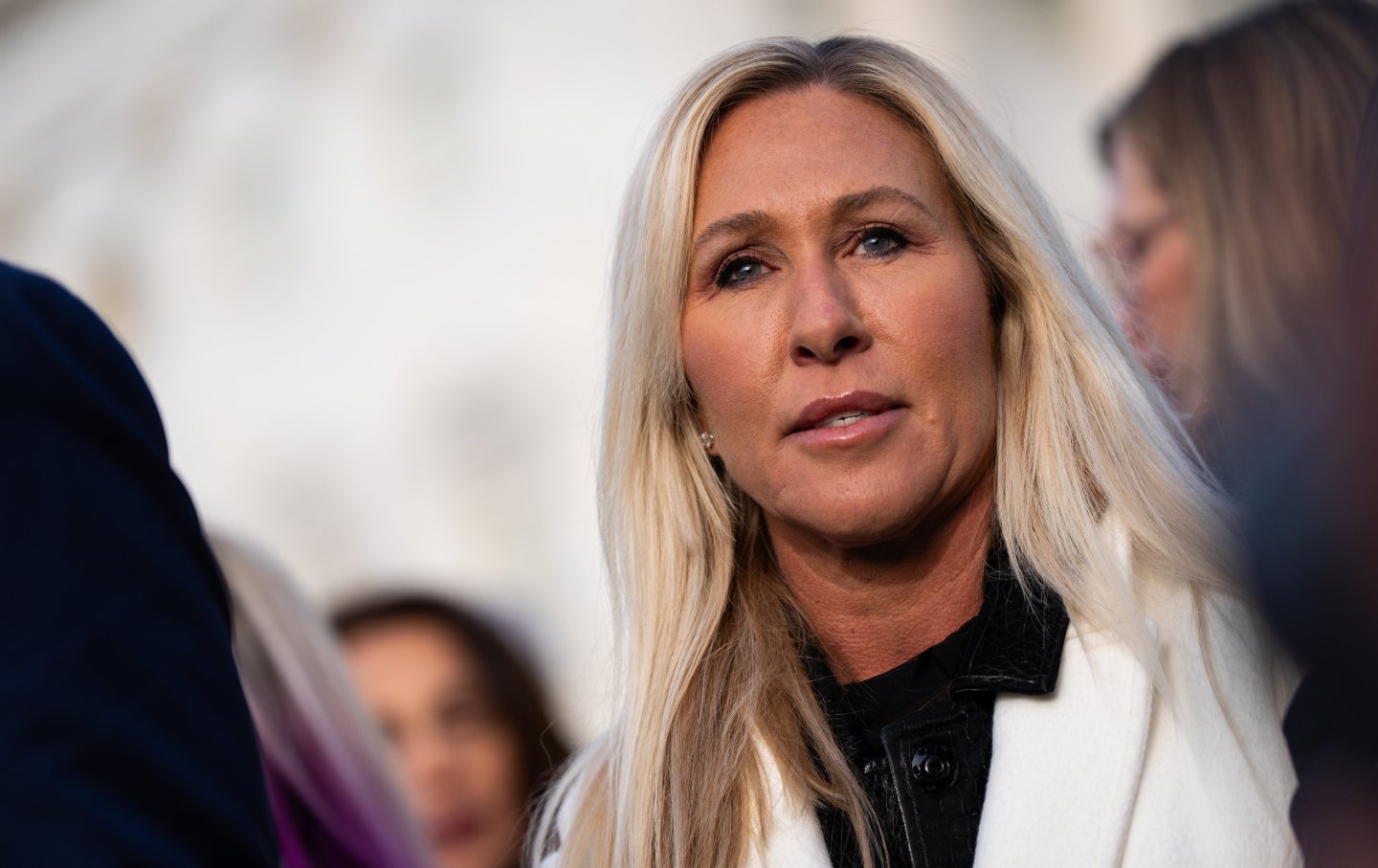Biden’s Pro-Democracy Message Is Too Negative and Too Narrow
A winning campaign needs more than just revulsion at the January 6 coup.

US President Joe Biden and First Lady Jill Biden arrive for a wreath-laying ceremony at the National Memorial Arch in Valley Forge National Historical Park on January 5, 2024.
(Photo by Mandel Ngan / AFP via Getty Images)As they start rallying voters for the 2024 presidential election, Joe Biden and Donald Trump agree on one thing: Their latest battle is not just a rematch of the 2020 campaign but also a referendum on the attempted coup of January 6, 2021. The current and former president have both given major speeches casting the events of January 6 as far more urgent than a mere political dispute. Rather, this has become a way of separating out patriots from those willing to forgo the constitutional order.
On January 5 at Valley Forge, Pa., Biden gave a major address that accurately and effectively defined the January 6 insurrection as “a dagger at the throat of American democracy.” Briskly describing Trump’s machinations against democracy, and noting his opponent’s dictatorial aspirations, Biden made a compelling case that “democracy is on the ballot.”
Trump, as is his habit, is responding with a tu quoque argument claiming, falsely, that Biden is the actual threat to democracy and that the incumbent used federal law enforcement to target Trump and his supporters. As The New York Times reports, “Three years after the former president’s supporters stormed the Capitol, Mr. Trump and his campaign are engaged in an audacious and baseless attempt to paint Mr. Biden as the true menace to the nation’s foundational underpinnings. Mr. Trump’s strategy aims to upend a world in which he has publicly called for suspending the Constitution, vowed to turn political opponents into legal targets and suggested that the nation’s top military general should be executed.”
Trump’s demagoguery is shameless—but also regrettably effective in winning over Republicans. As Biden himself ruefully notes, many Republicans and conservatives who were critical of Trump in the immediate wake of January 6 have reconciled themselves to the former president’s dishonest account of the attempted coup. At Valley Forge, Biden recalled:
When the January 6 attack happened, there was no doubt about the truth. At the time, even Republican members of Congress and Fox News commentators publicly and privately condemned the attack.
As one Republican senator said, “Trump’s behavior was embarrassing and humiliating for the country.” But now, that same senator and those same people have changed their tune.
But this frank acknowledgment that Trump has been able to win back supporters he lost after the January 6 fiasco raises questions about the wisdom of Biden’s decision to make the coup attempt the overriding issue of his campaign. Equally telling is the fact that Biden won’t even name the senator who flip-flopped on this crucial matter—likely out of a futile attempt to retain bipartisan comity. While anxiety about the survival of democracy is pervasive across the political spectrum, there is no consensus among voters as to where the threat to democracy comes from.
According to a Gallup poll conducted last month, only 28 percent of Americans are satisfied with the state of democracy, a record low. But there is a partisan divide on this issue. Republicans are the most dissatisfied, with only 17 percent pleased with the status quo. Conversely, Democrats are more than twice as likely see democracy as working just fine, with 38 percent satisfied. That number is low, but still much higher than among Republicans. These numbers suggest that if the threat of democracy is at the forefront of the campaign, it would benefit Trump more than Biden.
This deep partisan divide on democracy surely blunts the usefulness of the issue for persuading new voters. Instead, both Republicans and Democrats are left with pro-democracy messages as a way to rally their base, who feel that the other side is destroying democracy. Biden admits as much by saying, “And now these MAGA voices who know the truth about Trump on January 6th have abandoned the truth and abandoned democracy. They made their choice. Now the rest of us—Democrats, independents, mainstream Republicans—we have to make our choice.” One can question the decision to call the very small number of anti-Trump Republicans “mainstream Republicans.” Unfortunately, the MAGA crowd are the true mainstream Republicans now.
The residual coalition Biden calls “the rest of us” is the same set of people who gave him his victory in 2020, a resounding popular vote majority that translated into a narrow Electoral College win (a shift of roughly 44,000 votes in three states would have resulted in an Electoral College tie, with Trump likely winning in the House of Representatives, where each state delegation would cast a vote).
To win reelection, Biden has to keep this coalition of “the rest of us” together. Since Biden is deeply unpopular, he’s decided to run a negative campaign focused on the genuine fear of Donald Trump, perhaps the most powerful glue holding together Biden’s coalition.
Yet, in framing the threat to democracy purely in terms of the revulsion against the January 6 coup and the need to thwart Trump’s dictatorial aspirations, Biden is putting forth a narrow, negative message that risks undermining his reelection chances. After all, voters need hope as well as fear. In 2020, Biden ran not just on a negative campaign against Trump but also on a new deal for workers, a more effective response to Covid, and a foreign policy of restoring the liberal international order.
Biden’s record as president has been mixed. The Inflation Reduction Act of 2022 was a major intervention into the economy, one that made crucial contributions to addressing climate change, healthcare, and economic inequality. On foreign policy, Biden’s success in restoring American alliances, as evidenced by the coalition supporting Ukraine in its war against Russia, has been undercut by his Middle Eastern policy, one-sided support of Israel that is undermining America’s stated commitment to international law and risks triggering a wider regional war.
Biden’s low favorability numbers are traceable to the fact that significant parts of his coalition are dissatisfied with his policies. Many Biden voters feel he hasn’t done enough to fulfill promises on issues like student debt relief, that despite robust job growth the economy remains deeply unfair, or that the president’s foreign policy betrays his own stated principles of upholding human rights.
Popular
“swipe left below to view more authors”Swipe →Biden’s pro-democracy message is strangely abstract and without substantive content, with democracy being defined merely as opposing dangerous autocrats such as Trump. In his Valley Forge speech, Biden said, “We’ll be voting on many issues: on the freedom to vote and have your vote counted, on the freedom of choice, the freedom to have a fair shot, the freedom from fear.” Nowhere does Biden specify how he’ll protect the freedom to vote (revitalizing the Voting Rights Act seems to be a dead letter), or how he’ll restore freedom of choice, when both the courts and many states are radically hostile to reproductive rights. Nor does Biden consider that the threat to voting rights and reproductive freedom comes not just from Trump but also—often more dangerously—from Republican jurists and lawmakers. And in decrying Trump and MAGA Republicans, Biden never considers that these dangerous reactionary forces are empowered by long-standing antidemocratic features of the Constitution such as the Electoral College.
Biden’s speech raises the fundamental question: What is the purpose of democracy? Is democracy worth cherishing simply as a set of principles and procedures? Or does democracy exist to actually advance the popular will? If the latter is true, what are we to make of the fact that on issues like student debt, reproductive freedom, and the need for a cease-fire in Gaza, the American political system thwarts what large majorities actually want?
Trump is a threat to democracy and deserves to be defeated for that reason. But he’s not the only threat to democracy, and he thrives in part because the American political system is trapped in gridlock and dysfunction. By framing the pro-democracy argument in narrow terms of simply defeating Trump, Biden is undermining the urgent task of defending and expanding democracy in a time of peril.
Disobey authoritarians, support The Nation
Over the past year you’ve read Nation writers like Elie Mystal, Kaveh Akbar, John Nichols, Joan Walsh, Bryce Covert, Dave Zirin, Jeet Heer, Michael T. Klare, Katha Pollitt, Amy Littlefield, Gregg Gonsalves, and Sasha Abramsky take on the Trump family’s corruption, set the record straight about Robert F. Kennedy Jr.’s catastrophic Make America Healthy Again movement, survey the fallout and human cost of the DOGE wrecking ball, anticipate the Supreme Court’s dangerous antidemocratic rulings, and amplify successful tactics of resistance on the streets and in Congress.
We publish these stories because when members of our communities are being abducted, household debt is climbing, and AI data centers are causing water and electricity shortages, we have a duty as journalists to do all we can to inform the public.
In 2026, our aim is to do more than ever before—but we need your support to make that happen.
Through December 31, a generous donor will match all donations up to $75,000. That means that your contribution will be doubled, dollar for dollar. If we hit the full match, we’ll be starting 2026 with $150,000 to invest in the stories that impact real people’s lives—the kinds of stories that billionaire-owned, corporate-backed outlets aren’t covering.
With your support, our team will publish major stories that the president and his allies won’t want you to read. We’ll cover the emerging military-tech industrial complex and matters of war, peace, and surveillance, as well as the affordability crisis, hunger, housing, healthcare, the environment, attacks on reproductive rights, and much more. At the same time, we’ll imagine alternatives to Trumpian rule and uplift efforts to create a better world, here and now.
While your gift has twice the impact, I’m asking you to support The Nation with a donation today. You’ll empower the journalists, editors, and fact-checkers best equipped to hold this authoritarian administration to account.
I hope you won’t miss this moment—donate to The Nation today.
Onward,
Katrina vanden Heuvel
Editor and publisher, The Nation
More from
Jeet Heer 

Why Epstein’s Links to the CIA Are So Important Why Epstein’s Links to the CIA Are So Important
We won’t know the full truth about his crimes until the extent of his ties to US intelligence are clear.

In America, Mass Shooting Survivors Can Never Know Peace In America, Mass Shooting Survivors Can Never Know Peace
A growing number of US residents have lived through more than one massacre.

Corporate Democrats Are Foolishly Surrendering the AI Fight Corporate Democrats Are Foolishly Surrendering the AI Fight
Voters want the party to get tough on the industry. But Democratic leaders are following the money instead.

Sleepy Donald Snoozes, America Loses Sleepy Donald Snoozes, America Loses
It’s bedtime for Bozo—and you're paying the price.

The Revolt of the Republican Women The Revolt of the Republican Women
Speaker Mike Johnson’s sexism is fueling an unexpected uprising within the GOP caucus.

Donald Trump’s Imperialism Is Murdering People—at Home and Abroad Donald Trump’s Imperialism Is Murdering People—at Home and Abroad
Trump’s boat bombings deserve legal retribution, but also show why we need an entirely new foreign policy.


